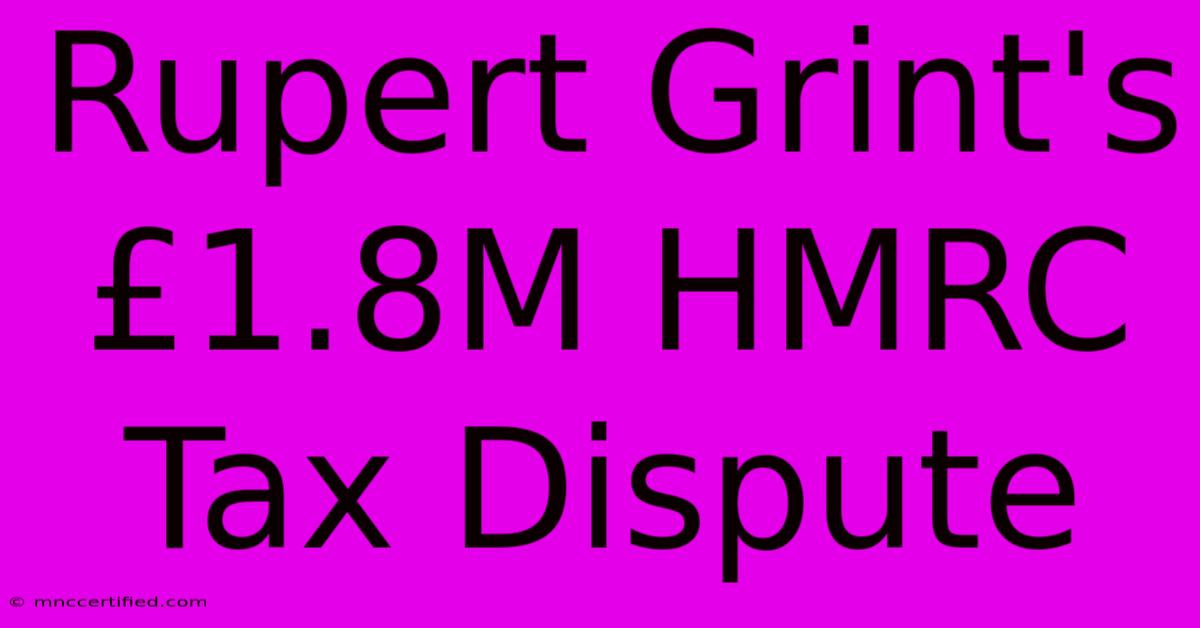Rupert Grint's £1.8M HMRC Tax Dispute

Table of Contents
Rupert Grint's £1.8M HMRC Tax Dispute: A Detailed Look
Rupert Grint, the beloved Ron Weasley from the Harry Potter franchise, recently found himself embroiled in a significant tax dispute with Her Majesty's Revenue and Customs (HMRC). The dispute, involving a claimed £1.8 million, highlights the complexities of tax law, particularly for high-earning individuals with complex financial structures. This article delves into the details of the case, exploring the potential reasons behind the dispute and its implications for both Grint and the broader public understanding of tax matters.
Understanding the Dispute: Key Details
While specific details of Grint's tax dispute remain confidential due to legal reasons, reports suggest that the £1.8 million claim relates to unpaid taxes on his substantial earnings from the Harry Potter films and subsequent acting roles. The disagreement likely centers around the interpretation of tax regulations regarding income earned abroad, investment income, or potentially, the structure of his business dealings. HMRC, responsible for collecting taxes in the UK, claimed Grint owed a significant sum, leading to the dispute.
The Role of Offshore Accounts and Tax Avoidance
High-profile individuals often utilize complex financial structures, including offshore accounts and trusts, for various reasons, including asset protection and tax planning. While these structures are not inherently illegal, they can become subject to scrutiny if HMRC believes they were used to avoid paying the correct amount of tax. The possibility of offshore accounts playing a role in Grint’s case cannot be ruled out, although this has not been officially confirmed. This aspect adds complexity to the dispute and underscores the increasing scrutiny placed on tax avoidance schemes by authorities globally.
The Implications of the Dispute
The Grint case has significant implications on several levels:
-
Celebrity Tax Scrutiny: High-profile individuals often face increased scrutiny regarding their tax affairs. Their wealth makes them attractive targets for investigations, potentially setting a precedent for how HMRC tackles tax disputes involving similar high-net-worth individuals.
-
Complexity of Tax Law: The case highlights the intricate nature of UK tax law. Even those with access to professional financial advice can face difficulties interpreting and complying with the regulations fully. This underscores the need for clear, accessible guidance on tax matters for both individuals and businesses.
-
Public Perception of Tax Avoidance: Tax avoidance, even if legal, often faces public criticism. The Grint case potentially reignites the debate surrounding tax fairness and the responsibilities of high-earning individuals to contribute their fair share to society.
Resolution and Future Outlook
The details of the resolution of Grint's tax dispute haven't been publicly released. It’s likely that negotiations between Grint's legal team and HMRC took place, potentially involving compromise or further investigation. Cases like this can often be settled out of court to avoid lengthy and expensive legal battles.
Learning from the Case
The Rupert Grint HMRC tax dispute offers a valuable lesson: proactive and meticulous tax planning is crucial. High-net-worth individuals, particularly those with complex financial arrangements, should seek expert advice from qualified tax professionals to ensure full compliance with the law and avoid potentially costly disputes.
SEO Keywords Used:
- Rupert Grint
- HMRC
- Tax Dispute
- Tax Avoidance
- Offshore Accounts
- Harry Potter
- UK Tax Law
- High-Net-Worth Individuals
- Celebrity Tax
- Tax Planning
This article aims to provide comprehensive information and analysis. Remember to always consult with qualified legal and financial professionals for personalized advice on tax matters.

Thank you for visiting our website wich cover about Rupert Grint's £1.8M HMRC Tax Dispute. We hope the information provided has been useful to you. Feel free to contact us if you have any questions or need further assistance. See you next time and dont miss to bookmark.
Featured Posts
-
Georgia Tech Vs Georgia Betting Odds And Pick
Nov 30, 2024
-
Acordes De La Bondad De Dios
Nov 30, 2024
-
Breach Of Contract Insurance
Nov 30, 2024
-
Irish Election Results Counting Underway
Nov 30, 2024
-
Rupert Grint 1 8m Tax Bill
Nov 30, 2024